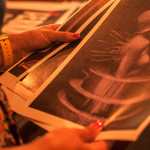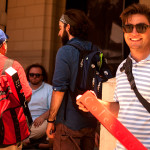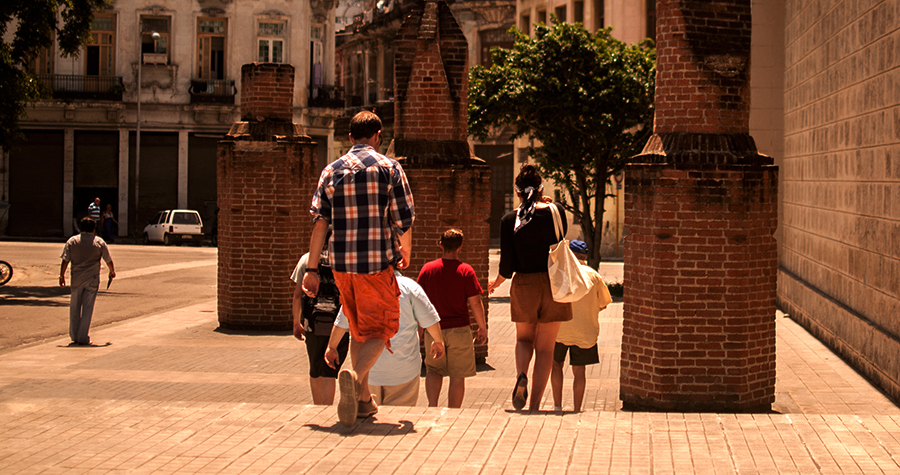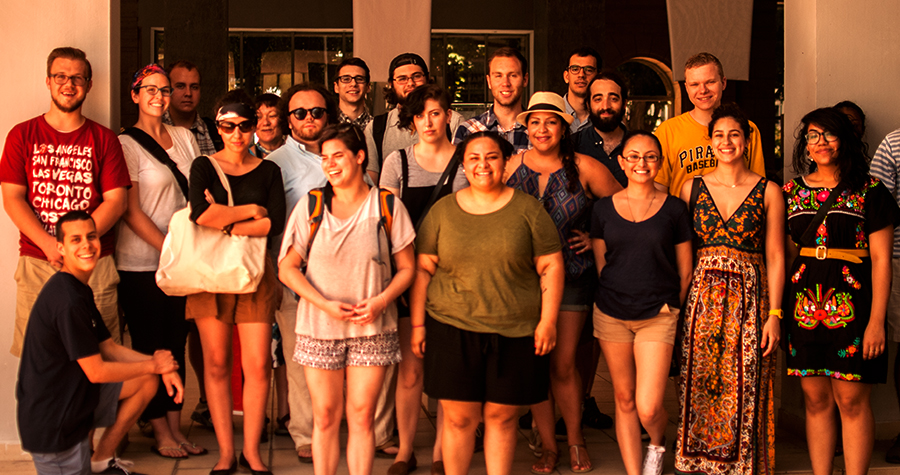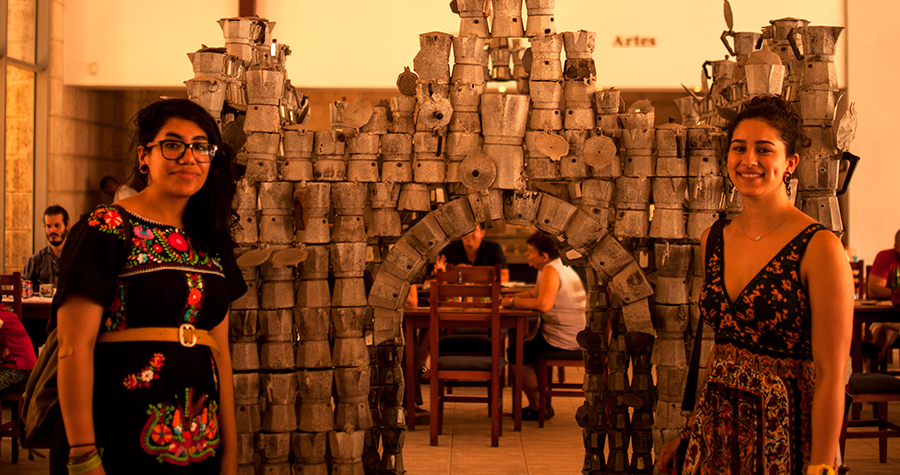
Confluences: Trips that took years
CUBA-UNITED STATES — There is a part of Krystal Ortiz’s maternal family that she doesn’t know. Born in Miami, she’s a Cuban-American but has never gone to Cuba.
One afternoon in Chicago, where she studied at DePaul University, one of her professors talked her into making a trip. Félix Massud, a Political Science graduate with a Ph.D. in History, has devoted much of his academic life to studying Cuba. For over 20 years, he has headed one of the student-exchange projects in the U.S. that, despite the limitations of travel to the island, has survived until now.
Krystal perhaps didn’t know all that. She just decided to come to Cuba and meet her family. Her mother didn’t want her to; she warned Krystal about tripping in potholes, about the bad taste of a ramshackle country that’s not worth seeing.
The mother left Cuba at the age of 8 and never returned. She grew up as a Cuban-American and knows that, for her daughter, speaking English is one of the best ways to be successful.
Krystal spent five consecutive Saturdays before the trip listening to Professor Felix in a classroom, sort of preparing to better understand the island’s economic and historic background. Her family had never talked to her much about Cuba, a country that she carries in her blood.
“My father comes from a Cuban family, but he was born in New York, so he is half Cuban, half American. At home, they don’t speak Spanish. I spoke it when I was little because my grandparents lived with us, but after they moved out I didn’t speak it anymore because my parents didn’t,” she says in a Spanish that she tries hard to remember, a language that she finds increasingly meaningful. “Maj o meno,” she says, with an island accent — “mo’ o’ less.”
MEXICO-UNITED STATES — Alma goes to Mexico every year. However, she went to Colombia for the first time last December. She describes herself as Colombian-Mexican, because her mother and father come from those countries, respectively.
“When someone asks me where I grew up, I say ‘the United States and Mexico,’ because I feel that I have two homes,” she says. She studies “custom technology” at DePaul University, where she met Krystal.
The school offers several programs to study abroad, but one of the few programs it has in Latin America involves Cuba. Alma applied for it last year and was accepted this year.
She’s interested in Cuba. Studying theater, she has learned a lot about the revolutions and the social movements in this continent.
“What has struck me the most is that Cuba is the beginning of everything. The Cuban Revolution inspired the rest of Latin America to seek its independence. I know Mexico a little bit better and every time I’m there I feel that Che is everywhere. I would love to know what the links are; why Cuba could inspire Latin America.
On the other hand, every Cuban-American I know in the United States has another opinion of the Revolution. They say that it’s not good, that the Castros are not good, not even Che. And, to me, that’s a conflict because my family in Mexico loves Cuba, loves Che. And my Cuban friends say otherwise.”
CUBA-MIAMI — Félix Massud didn’t know how to explain to his family that he was going to travel to the island. He couldn’t continue to study in this country and remain distant, even though Miami in many ways is very close to Cuba.
He left the island in 1961, at the age of 11, after the invasion of Girón Beach, when numerous Cuban parents believed that their sons would be sent to the Soviet Union as soldiers. He returned almost 20 years later.
Félix had worked in Areíto, a magazine that published interviews with personalities in the Cuban government and culture and tried to reflect a Cuba different from the one that has traditionally been sold in the U.S., particularly in Miami.
The group in which he came was composed mostly of the first Cubans to return after the Girón invasion, because earlier there was almost no contact. To him, to try to understand the Cuban Revolution was also to understand his family history.
Then came the academic exchanges between universities. And Félix joined them. “To me, this is the best part of being a professor.”
MIAMI-HAVANA — “It was emotional,” Krystal says when relating the moment in which she was introduced to her family. She feels that she’s not really from anywhere. In Cuba, she’s known as “la gringa”; in the United States, as “la cubana.”
“This has been — I can’t find the word.” I tell her she can say it in English. “I can’t find it in English either.”
Then we realized that no word was needed. Life here is very different from life there.
“I’m not quite sure, but I think that, because there isn’t much Internet here and you don’t spend all the time looking at the cell-phone screen, you’re paying more attention to the people. The emotions come in a more direct way. We don’t speak through devices; we look at one another face to face,” she tries to explain.
Because she’s young, Krystal already has the tools that many in our generation in Cuba must buy when they arrive in the United States. Here, the days are longer, she says, but “it’s not that time goes by more slowly,” it’s just that people utilize time better, they do more.
“There’s also more community life. We’re always talking to people, whereas in Miami everything is more individual. That’s why I want other people to know Cuba. Other students come only to spend their vacation, they spend the whole day in the hotel. But I think that there are more students who want to see more. Things here are complicated but there are a lot of good things. And there aren’t as many split families, as much accumulated sadness. Normally, we think of Cuba as an island, sun and beaches, but Cuba is also a nation.”
CHICAGO-HAVANA — Alma and Krystal are “a team.” Once on Cuban soil, the combination of their Latin roots and their life in the United States becomes exotic, the same way that Cubans could be exotic to them, at least at first.
After two week of asking questions, of observing, and above all of feeling, they are also different. That’s the word, also, because when they come, when they keep coming, we are and shall be different.
“Over there,” they’re not taught Latin American history. “They,” the government of the United States, are always the good guys. Students are taught about World War One in a one-day course. There is very little content about Cuba. History books have nothing about it, “except that Castro is not a good guy.”
They don’t get the hues of the island through the school or the media or the family.
“The way the United States depicts history, everything can be blamed on this communist place, a place you shouldn’t go into, where they don’t like us because we’re capitalists. That’s how I thought about it. It wasn’t until I took a course with Félix that I learned about the embargo after the revolution, about the Missile Crisis. And I discovered that in reality the United States is to blame for what happened here and in the rest of Latin America,” Alma says.
Being here not only gives students another point of view for analysis, it also unveils other sources of information. And vice versa.
UNITED STATES-CUBA — Academic exchanges began in the 1970s, Félix recalls, when there was a slight change in U.S. policy toward Cuba.
“It began in the Carter era; university students began to come here and students here could travel there. With Reagan, that changed. It was a harder line, although some of those exchanges remained. Ironically, it was during the period of Clinton, ‘the great liberal and democrat,’ when all the trips were canceled, all of them.
“We kept up the exchange programs but now through a complex process of licenses. We had to get a license at the Treasury Department, which has a series of regulations. There was a limit to what we could spend in Cuba; we couldn’t bring along students from another university, and so on,” Félix says. Things were worse with Bush Jr.
“At that time, Washington came up with the ‘plan to promote democracy in Cuba.’ They saw the number of programs of this type — more than 120 similar to this one. Two weeks in Cuba, with pre-travel preparation in lectures and classes. Our university has a very broad program; I think that we regularly travel to more than 60 countries. But without a doubt Cuba has been the most problem-ridden.”
During the Bush Jr. administration, it became more difficult to get licenses for short trips. Long trips (16 weeks) became so expensive that they were almost abandoned.
“I think that out of 10 university programs, only 2 or 3 survived.” Because licenses were denied under Bush Jr., trips to Cuba by DePaul University students were replaced by programs in Chile and Argentina until 2011, when Obama simplified the access of Americans to Cuba, as he had promised during his presidential campaign.
HAVANA — Sunday, June 28, 2015; 9 p.m. It is Alma’s last day here. She visited the sea for the second time in her life. Krystal remained with her family a few days longer. Professor Félix probably will lengthen his stay. Group farewell. Dinner, photos, toasts, laughter, hopes. Not all but some of those who arrived two weeks ago are no longer the same. Cuba is not the same anymore. And neither am I.

